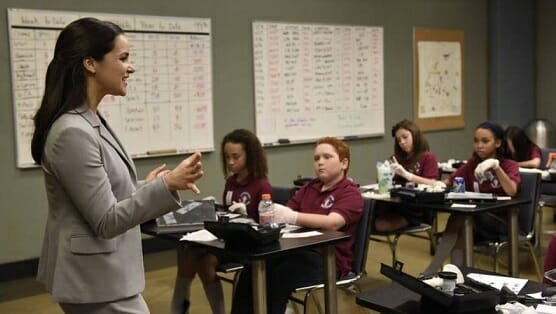Brooklyn Nine-Nine: “The Chopper”
(Episode 2.22)

ake Peralta learned everything he knows about police work from watching movies. This is a nonessential component of Peralta’s character, compared to meatier personal details—his relationship with his dad, for example, or the cardinal failures of his career. But the guy loves action flicks, particularly Die Hard. Frankly, if Brooklyn Nine-Nine owes a debt to any one cop film, it’s Hot Fuzz and its adrenalized ridiculousness. One of the principles in that movie dreams about two-fisting a pair of pistols while pirouetting through the air. He has been weaned on Bad Boys and Point Break. Peralta’s personal hero is John McClane, but he and Danny Butterman would get on famously nonetheless.
In the penultimate episode of Brooklyn Nine-Nine’s second season, Jake gets to (sort of) live out a series of policing fantasies: He gets to take on a big ticket case that involves murder and moolah, and in pursuit of solving that case he gets to fly in a chopper. The realization of Jake’s reveries comes at a cost, of course, because Madeline Wuntch makes no offers without strings attached. Her reappearance is a bad omen, and Holt knows it. So our favorite phlegmatic captain assigns himself to Jake’s detail with Boyle, and the trio sets out to solve the mysterious deaths of the Fulton Street Four, an infamous gang responsible for the theft of $21 million and whose members are currently dropping like flies.
Jake immediately concludes that one of the crooks is knocking off the others to stake sole claim over the cash. He’s right, naturally, and we know he’s right from the very start because he’s Jake Peralta. Holt’s protestations are easy to push aside. (Boyle, for the most part, does little here but prove how bad he is at taking photos on a smartphone, which in the grand scheme of things, is plenty.) But we know the truth to Holt and his doubting—he suspects, also rightly, that Wuntch is up to something. That something ends up being rather meaningful in ways that Brooklyn Nine-Nine rarely engages with, which isn’t a complaint but an observation of type. This is a sitcom. Sitcoms don’t generally need huge shake-ups to be vital. They just need to focus on characters, set-ups, and punchlines.
-

-

-

-

-

-

-

-

-

-

-

-

-

-

-

-

-

-

-

-

-

-

-

-

-

-

-

-

-

-

-

-

-

-

-

-

-

-

-

-








































